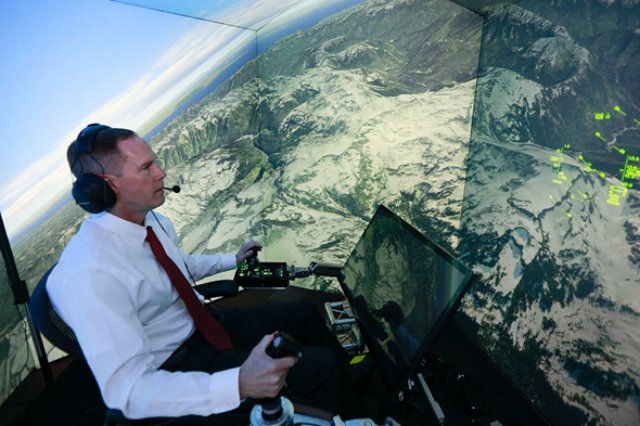 Fighter pilots undergo extensive specialized training to be able to outwit opponents in battle, and that professional experience seems like it would be hard, even impossible, to replicate. But a new artificial intelligence system, ALPHA, has been besting expert pilots in combat simulations, even when the A.I. is given a handicap.
Fighter pilots undergo extensive specialized training to be able to outwit opponents in battle, and that professional experience seems like it would be hard, even impossible, to replicate. But a new artificial intelligence system, ALPHA, has been besting expert pilots in combat simulations, even when the A.I. is given a handicap.
Given years of discussion about military drones, it seems like a fighter plane piloted by A.I. wouldn’t be so surprising. But unmanned aerial combat vehicles are usually remote-controlled by a person, at least in part, and are used for things like attacks and reconnaissance, not one-on-one fighting. This has been changing, though.
ALPHA was developed by aerospace engineer Nick Ernest, a recent doctoral graduate of University of Cincinnati whose company Psibernetix works with the Air Force Research Laboratory. ALPHA has been victorious in numerous simulated battles against top fighter pilots, including a series in October against retired United States Air Force Colonel Gene Lee.
Lee told University of Cincinnati Magazine that:
It seemed to be aware of my intentions and reacting instantly to my changes in flight and my missile deployment. It knew how to defeat the shot I was taking. It moved instantly between defensive and offensive actions as needed. … Sure, you might have gotten shot down once in a while by an AI program when you, as a pilot, were trying something new, but, until now, an AI opponent simply could not keep up with anything like the real pressure and pace of combat-like scenarios.
ALPHA’s prowess is impressive, but equally amazing is the tiny computer that runs it. For such a complicated set of decision-making algorithms, ALPHA requires very little processing power, running on a $35 Raspberry Pi minicomputer. ALPHA uses what are called “fuzzy logic algorithms” to form a “Genetic Fuzzy Tree” system that breaks big problems down into smaller chunks so the system can evaluate which variables are relevant to a particular decision and which of those are most important. This allows the system to work more efficiently and rapidly.
ALPHA still flys in a simulated world, but as technology continues to evolve behind combat drones and autonomous vehicles it seems more and more likely that it will converge in something like the real-world version of ALPHA. It’s a powerful technology, but it makes you wonder whether we as humans really want to be getting “better” at war. Hopefully these advances will mean fewer human casualties.
Source: Slate
